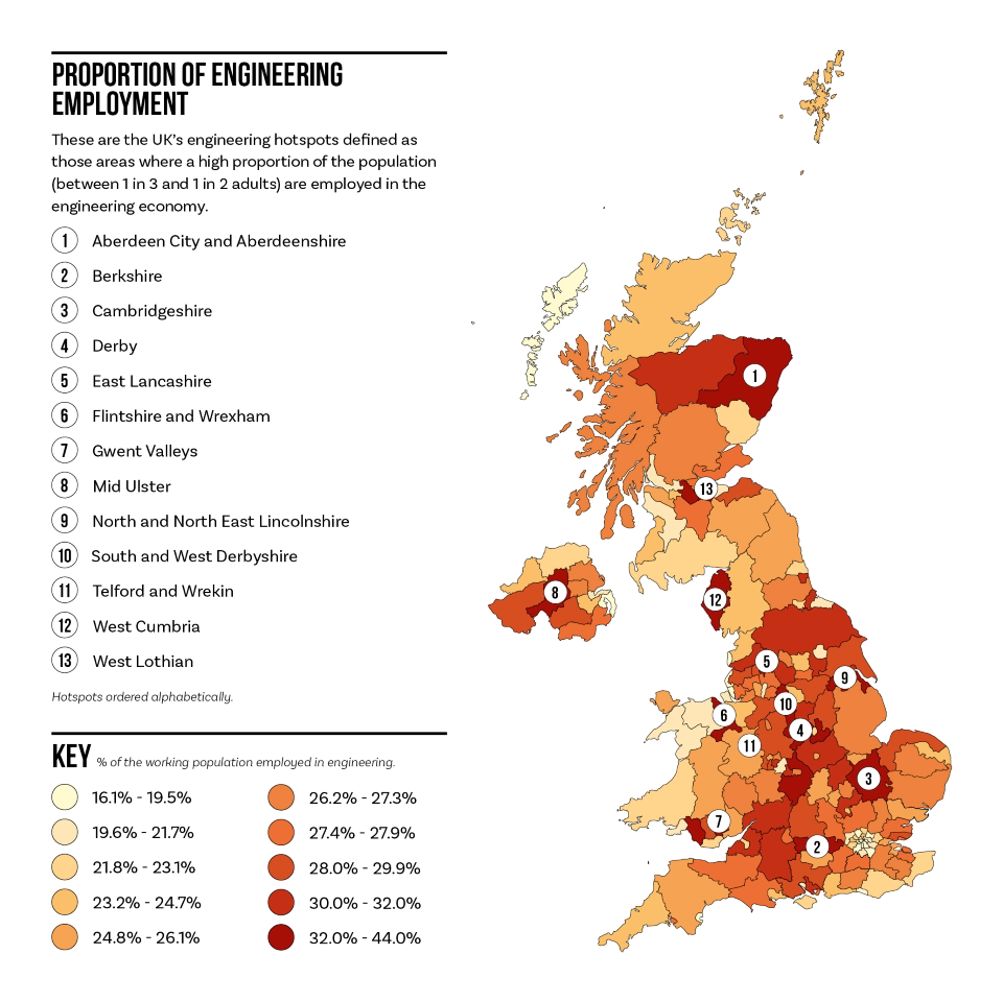The research has been released by the Royal Academy of Engineering on National Engineering Day, which is celebrating UK engineering and highlighting the importance of the profession.
The research, conducted by Metro Dynamics for a project commissioned by the Royal Academy of Engineering, also reveals that over eight million people – or over a quarter of all UK workers – are part of the nation’s engineering economy, and that the UK is home to 729,000 engineering businesses. Furthermore, on average the annual economic output generated from an engineering job is estimated to be 23 per cent higher than the average job in the UK.

In a statement, Dr Hayaatun Sillem CBE, CEO of the Royal Academy of Engineering, said: “On National Engineering Day, we want to celebrate the UK’s engineers and showcase how they are improving our lives for the better. This new research emphasises the economic impact of the sector right across the UK, revealing how important engineering is for employment and prosperity in a wide range of regions.
"Through their work in these regions, these engineers will also be improving healthcare, providing secure and sustainable energy and contributing towards a sustainable and equitable future for people across the UK and beyond. Put simply, they are playing a vital role in tackling the problems we face today and improving our lives for tomorrow.
"However, if the profession is to continue to drive change, we need more people from a wider range of backgrounds to choose engineering. Through National Engineering Day we hope to inspire the next generation of engineers to join this future-shaping profession.”
The research found 13 engineering hotspots across the country where a high proportion of the population - between one-in-three and one-in-two adults - are employed in the engineering economy. They include Mid Ulster, West Cumbria, Flintshire and Wrexham, Aberdeenshire, Derby, and East Lancashire.
The research released today (November 2, 2022) is part of 'Engineering, Economy & Place,' which is due to be published later this year by the Royal Academy of Engineering and Metro Dynamics.
Areas benefitting economically from engineering include:
Scotland: Engineering contributes more than £46bn to the nation’s economy (£46,841,698,128) annually, employing 516,585 people across 48,435 engineering businesses and an additional 155,465 engineers in other industries. Engineering generates more than £5bn GVA annually for each of the local economies of Glasgow (£6,078,961,808), Edinburgh (£5,795,771,141) and Aberdeenshire (£6,565,044,338)
London: Engineering generates more than £126bn GVA for the capital annually. The city has 132,305 engineering businesses and employs more than one million people in engineering jobs (1,079,348)
Birmingham: The profession generates more than £8bn (£8,151,415,612) for the city’s GVA annually. Birmingham’s engineering economy boasts 8,505 engineering businesses and 113,585 employees in engineering jobs.
Yorkshire and the Humber: Engineering generates more than £44bn GVA (£44,522,727,252) for the region annually, employing 502,145 people across 48,840 engineering businesses and an additional 166,683 engineers in other industries.
Berkshire: The county’s engineering economy includes 15,715 engineering businesses and 177,387 people in engineering jobs, generating more than £19bn of GVA (£19,245,253,074) annually.
Hertfordshire: The county’s engineering economy generates more than £14.5bn in GVA (£14,527,665,719) annually from 18,700 engineering businesses and 178,177 people working in engineering jobs.
Oxfordshire: Engineering generates more than £8bn GVA (£8,035,533,166) annually for the county, employing 87,330 people across 8,740 engineering businesses plus 23,710 engineers in other sectors.
Cambridgeshire: The county’s engineering economy generates more than £7bn GVA (£7,982,443,992) annually from 9,245 engineering businesses and 122,594 people in engineering roles.
Source: RAEng











Experts speculate over cause of Iberian power outages
The EU and UK will be moving towards using Grid Forming inverters with Energy Storage that has an inherent ability to act as a source of Infinite...